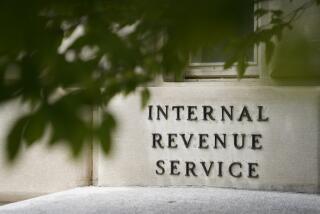What Gets the IRS’ Attention
- Share via
Pity the poor Internal Revenue Service.
In the last year, the IRS budget has been whacked, it’s had to lay off tax professionals and turn tough cases over to third-party collectors, and it’s failed to meet even its own modest goals of auditing one out of every 50 returns.
Does this mean you don’t have to worry about the IRS? That you can write what you want on your return and thumb your nose at this ineffectual agency?
Hardly. Instead, IRS Commissioner Margaret Richardson and her minions have focused more on targeting their audits.
They’re getting smarter about how to spot the return of a typical tax cheat and are focusing their most exhaustive audits on those cases most likely to turn up hidden megabucks.
What can you do? Avoid being audit bait by knowing where those red flags fly. If you have the kind of profile that’s more likely to get you audited, keep scrupulous records.
Never deny yourself a legitimate deduction (such as the home office deduction) just because you’ve heard it will get your return pulled out. If you can demonstrate you have the write-off coming to you, it’s silly not to take your breaks where you can find them.
Here are the most common reasons for IRS examinations:
* Standing out from the crowd with deductions that are out of whack with your income level.
The IRS has a secret computer scoring system that spits out unusual returns. If you make $30,000 a year and take a $20,000 deduction for charitable contributions, it’s likely to raise IRS eyebrows. What’s typical? In 1994, the last year for which these figures are available, taxpayers with adjusted gross income of between $30,000 and $40,000 wrote off an average of $4,078 in medical expenses, $2,808 in taxes, $4,069 in interest and $1,375 in contributions.
* Living above your means.
IRS examiners are looking to spot returns that appear to be hiding income. If you consistently show low adjusted gross incomes but increasingly high dividends and interest, examiners might want to know where you are getting the money to invest.
Or if you deduct unusually high property taxes from mediocre incomes, they might wonder how you can afford the house at all. For an IRS examiner, finding hidden income is usually a better bonus than a falsely claimed deduction.
* Owning your own business and being either really successful or really unsuccessful.
If you claim yourself a sole proprietor who struggles year after year to produce less than $25,000 in income, look out. That’s the group that has the highest level of audits, better than 1 in 20. The IRS might assume that you are using the business to deduct costs that are more legitimately nondeductible personal expenses or that you are hiding cash income. If, on the other hand, you run your business so well you grossed more than $100,000, that makes you the second-most popular IRS target. Where does all that money go?
* Being an entertainer, innkeeper or lawyer.
Entrepreneurs used to get irked with examiners who didn’t understand their businesses, but now savvy auditors know them all too well. The IRS published special audit guides on truckers, innkeepers, air charters, lawyers, morticians, musicians, foreign athletes, gas retailers and taxi drivers, and plans dozens more. These “market segment specialization program” targets will have high audit rates.
* Failing to match.
The IRS has gotten good at matching 1099 forms, which report interest, dividends and freelance fees, with the people who receive them. If your tax return reports less income than other people are telling the IRS you received, you can expect some special attention. Either fix your return or include an explanation of why you are getting forms for income you never actually received. For example, some of the income reported on your 1099 might be payments for business expenses you’ve passed through but not deducted yourself.
* Making silly mistakes and omissions.
Your return automatically gets kicked out of the conveyor if you make math mistakes, forget to sign the forms or omit Social Security numbers for claimed exemptions. Once it’s out of line, there’s no telling how carefully it will be combed. So make sure you do all of the little things right before you send in your form.
*
More on Taxes
* Coming Sunday: Columnist Kathy M. Kristof takes a look at tax breaks for adoption in this weekend’s Your Money pages.
* Coming Monday: Which tax software to buy? Columnist Lawrence J. Magid has some suggestions in The Cutting Edge.
* Coming Wednesday: A special package of tax stories, including a review of what’s new in the law and advice on running a home office.
* On the Web: The Times’ Web site tax guide is up, with relevant stories from the last few months and links to sites with additional information. Visit https://www.latimes.com/taxes. More stories will be added as they are published.
More to Read
Inside the business of entertainment
The Wide Shot brings you news, analysis and insights on everything from streaming wars to production — and what it all means for the future.
You may occasionally receive promotional content from the Los Angeles Times.










